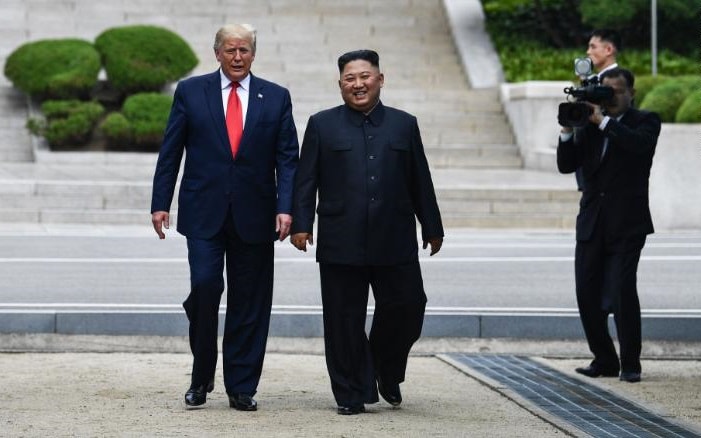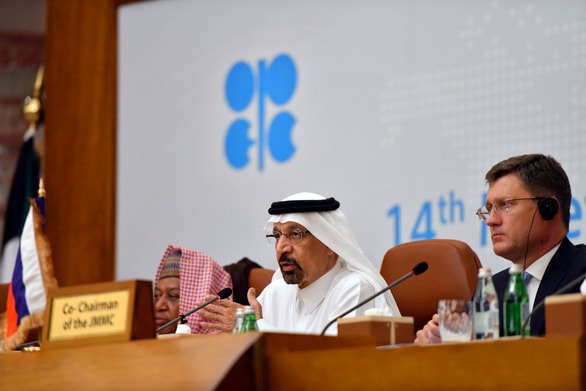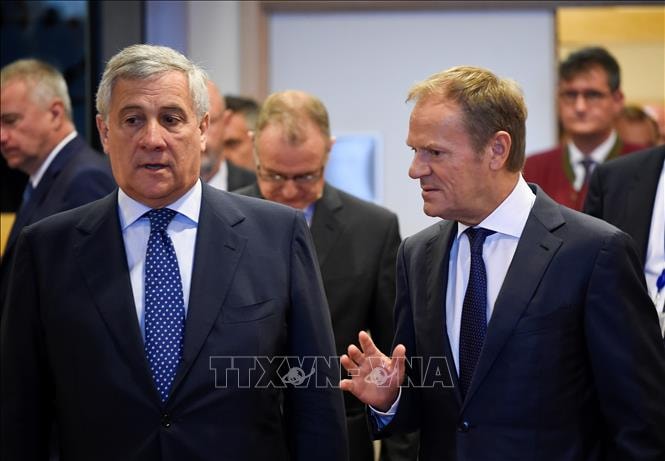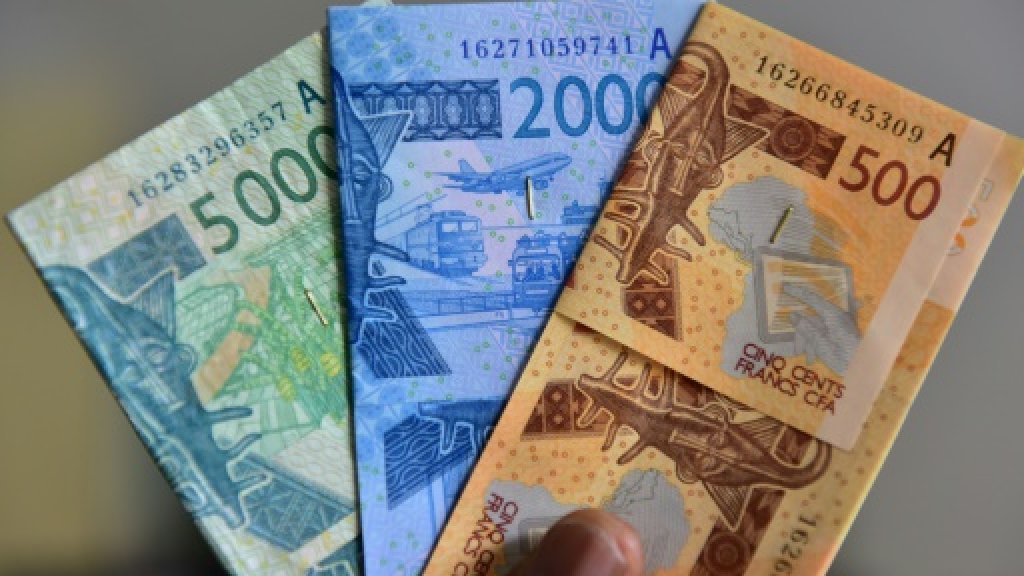US and North Korea agree to return to talks; Russia and Saudi Arabia discuss oil behind OPEC's back
(Baonghean.vn) - The US and North Korea agreed to return to negotiations after a historic meeting at the DMZ; Russia and Saudi Arabia discussed oil behind OPEC's back; West Africa's common currency is about to be put into circulation; Indonesia's Election Commission officially announced Mr. Joko Widodo as President... are the world's outstanding news in the past 24 hours.
US and North Korea agree to return to talks after historic meeting at DMZ
 |
| Historic photo of US President Trump entering North Korean territory at noon on June 30. Photo: Getty |
US President Donald Trump on June 30 concluded a 50-minute meeting with North Korean leader Kim Jong Un at the Peace House in the demilitarized zone (DMZ). After the meeting, the two US and North Korean leaders and South Korean President Moon Jae In walked out of the Peace House. Mr. Trump and Mr. Moon then saw Mr. Kim off back to North Korea.
Saying goodbye to the two leaders of the US and South Korea, Mr. Kim said: "The fact that we can meet at any time from now. I think this is the message that this meeting conveys." Speaking to the press after the meeting with Mr. Kim, the US President said: "The speed of the meeting is not the main issue, we want to see if we can make a complete and good agreement or not." "This is a great day. This is truly a legendary day, going down in history," Mr. Trump added and did not forget to repeat Mr. Kim's words that this was a "historic meeting". Mr. Trump also announced that the US will return to negotiations with North Korea with special representative Steve Biegun as the leader.
Russia and Saudi Arabia discuss oil behind OPEC's back
 |
| Saudi Arabian Energy Minister Khalid al-Falih speaks at an OPEC news conference on May 19, 2019 - Photo: Reuters |
Russia and Saudi Arabia support extending the oil production cut agreement with the Organization of the Petroleum Exporting Countries (OPEC) for another 6-9 months. The information was confirmed by the parties in the context of oil prices being under new downward pressure due to increased US supply and a slowing global economy.
Reuters news agency quoted Saudi Energy Minister Khalid al-Falih on June 30 as saying that it was likely the deal would be extended for another nine months without deeper cuts in quantity. Sharing the same view of wholeheartedly supporting the deal, Kirill Dmitriev - director of the Russian Direct Investment Fund and also the architect of the agreement between OPEC and Russia, said that the agreement (reached in 2017) has increased Russia's budget revenue by more than 7 trillion rubles ($110 billion).
According to Reuters, the announcement of the deal by Russia and Saudi Arabia before OPEC members met may have upset some smaller members of the group, who feel left out. "Who needs OPEC anymore" (when everything seems to have been decided), commented one delegate.
EU remains 'deadlocked' on nomination list for key positions
 |
| President of the European Parliament Antonio Tajani (left) and President of the European Council Donald Tusk talk at a conference in Brussels, Belgium on the evening of June 30, 2019. Photo: AFP/TTXVN |
On the evening of June 30, leaders of the 28 member states of the European Union (EU) met again in Brussels for an informal summit to agree on the list of nominees for key positions in the bloc. Previous meetings on the sidelines of the Group of 20 (G20) Summit in Osaka, Japan, failed to resolve the impasse. Observers said that the meeting, which will last until the morning of July 1, is unlikely to be enough time for the leaders to reach an agreement on the nomination of key positions in the future of the union.
There had been high hopes that the sidelines of the Osaka summit on June 28-29 would resolve the issue, with several national leaders and European Council President Donald Tusk meeting. At the G20, a meeting involving French President Emmanuel Macron and the prime ministers of Germany, Italy, Spain and the Netherlands secured representation for the three major party groups in the European Parliament (the European People's Party (EPP), the Socialists and Democrats (S&D) and the Liberals (ALDE) - which are expected to share key positions. Several phone calls between European cities and Osaka have been held but no agreement has yet been reached.
The Indonesian Election Commission officially announced that Mr. Joko Widodo became President.
.jpg) |
| Indonesian President Joko Widodo (center) and running mate Ma'ruf Amin (right) speak in Jakarta after the vote count results were announced on May 21, 2019. Photo: AFP/TTXVN |
On the afternoon of June 30, the National Election Commission (KPU) of Indonesia held a plenary meeting at the KPU Office in the capital Jakarta to officially announce that Mr. Joko Widodo had been elected President of Indonesia for the 2019-2024 term.
KPU Chairman Arief Budiman confirmed that with 85.6 million votes in favor, equivalent to 55.5%, the presidential and vice presidential candidates won the 2019 Indonesian election, Mr. Joko Widodo and Mr. Ma'ruf Amin. Meanwhile, the second candidate pair, Mr. Prabowo Subianto and Mr. Sandiaga Uno, received only more than 68.6 million votes, equivalent to 44.5%. This result will be effective after being confirmed at the KPU plenary meeting.
West African common currency to be put into circulation soon
Leaders of the member countries of the Economic Community of West African States (ECOWAS) have agreed to name the previously proposed common currency “ECO”.
 |
| Illustration photo: AFP |
Leaders of the Economic Community of West African States (ECOWAS) member states have agreed to name their proposed common currency “ECO”. The announcement came after the 15-member organization concluded its ECOWAS summit in the Nigerian capital Abuja on June 29.
In a statement, ECOWAS leaders said they aim to have a common currency in circulation by 2020, and reaffirmed “a gradual approach to the common currency starting with countries that meet the criteria.” The common currency will be based on a flexible exchange rate regime and a monetary policy framework focused on inflation targeting.
The statement stressed that member countries will pursue appropriate structural reform programs and policies, thereby maintaining rapid growth and economic restructuring.

